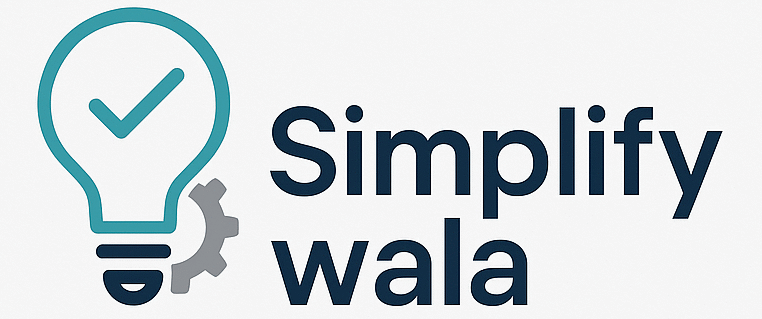By SimplifyWala — Where technology meets curiosity (and occasionally Mercury retrograde).
Introduction: When Alexa Reads Your Horoscope
Imagine this: You wake up, sip your morning chai, and instead of calling your trusted astrologer, you ask your AI assistant:
“Hey AI, should I take that new job offer?”
It pauses for two seconds, “consults” the cosmic database, and replies:
“According to my calculations… maybe. But also maybe not. Also, bring an umbrella.”
That’s right — AI is learning to talk like astrologers. But can it truly replace them, or is this just another case of tech trying to crash the spiritual party?
Why This Question Exists
Its been a known thing that Astrology has been practiced for thousands of years — blending mathematics, psychology, cultural traditions, and a sprinkle of the mystical.
But over the last few years, AI-powered astrology apps like Co–Star, Sanctuary, and AI horoscope chatbots have become popular. These tools promise instant star charts, relationship compatibility checks, and daily readings without ever leaving your couch.
Naturally, the question arises: If AI can write poems, drive cars, and even generate memes… why not horoscopes?
What Astrologers Actually Do
Before we hand over the cosmic keys to AI, it’s important to understand that astrologers do much more than “read the stars.”
A good astrologer:
- Interprets complex birth charts (planetary positions, houses, aspects).
- Considers cultural, regional, and personal contexts.
- Connects with clients emotionally — offering guidance and reassurance.
- Blends mathematical precision with human intuition.
It’s part data science, part counseling, part storytelling.
How AI Tries to Do It
AI approaches astrology like this:
- Collects Data – Your birth date, time, and place.
- Processes Information – Calculates planetary positions using astronomy data.
- Matches Patterns – Compares your chart to a vast database of existing interpretations.
- Generates Output – Writes predictions based on pre-learned text patterns.
It’s a bit like giving a calculator a personality and asking it to be your life coach.
Strengths of AI in Astrology
AI can outshine humans in certain areas:
- Speed: Can process 1,000 charts faster than you can say “Mercury retrograde.”
- Consistency: No mood swings, no bias from a bad coffee day.
- Accessibility: 24/7 availability, anywhere in the world.
- Personalization at Scale: Can handle millions of users and still “remember” everyone’s chart.
Weaknesses of AI in Astrology
However, anyone would agree that AI struggles where human connection matters:
- No True Intuition: AI can detect patterns but doesn’t have “gut feelings.”
- Cultural Nuance: Astrology often depends on traditions — Vedic, Western, Chinese — each with unique interpretations.
- Emotional Support: AI can simulate empathy but can’t genuinely feel it.
- Creative Flexibility: Humans can adapt readings to unusual life situations — AI may get confused if your “moon sign is in pizza.”
Case Study: AI Horoscope vs. Human Horoscope
I tested an astrology AI app and a human astrologer with the same birth details.
AI said:
“You may face challenges today. Trust yourself and focus on self-care.”
Human astrologer said:
“Today’s Mars–Saturn aspect could bring work frustrations. Avoid signing contracts until next week. Meditate for clarity.”
The difference?
AI gave a generic safe guess. The human offered specific context, timing, and actionable advice.
How AI and Astrologer responds?

Ethics & Emotions
Astrology often helps people during emotional moments — heartbreak, career uncertainty, grief.
While AI can offer quick insights, it lacks the warmth of a human voice and the cultural wisdom of an experienced astrologer.
Relying solely on AI for deeply personal guidance could feel… hollow and unfulfilling experience.
The Final Verdict
I think, AI won’t replace astrologers anytime soon. Instead, it’s more likely to become their assistant — calculating charts, spotting patterns, and freeing astrologers to focus on the emotional and spiritual aspects that machines can’t replicate.
In other words: AI can read the stars, but it still needs a human to understand them.
FAQ Section
Q1: Can AI predict the future accurately?
Not exactly. AI analyzes patterns in data — astrology or otherwise — but can’t foresee events with certainty.
Q2: Will AI astrology get better over time?
Yes, as natural language models improve, AI readings will become more nuanced and personalized.
Q3: Can AI replace Vedic astrologers?
It can replicate calculations, but the deep cultural and spiritual insights still require human expertise.
Q4: Is AI astrology free?
Many apps offer free readings, but advanced or personalized features may be paid.
Q5: Should I trust AI more than a human astrologer?
Trust both with caution — and use astrology (human or AI) as a tool for reflection, not as the sole decision-maker.

